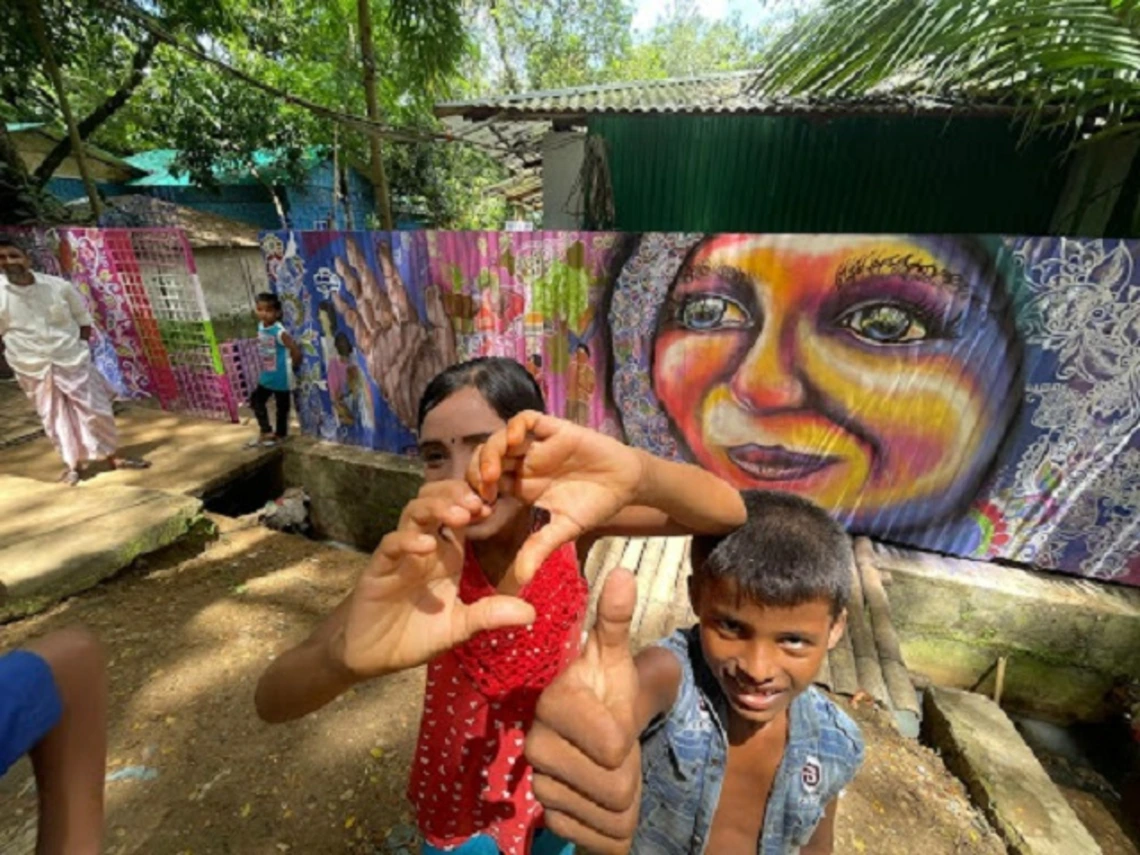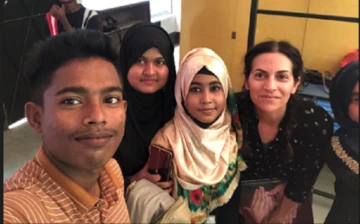Blog Series: Resilience of the Human Spirit and Learnings from our Time in a Rohingya Refugee Camp

Rohingya Children with Artolution Mural Project, Kutupalong Refugee Camp, Cox's Bazaar, Bangladesh July, 2022.
This article is part of a series of blogposts by UArizona Human Rights Practice students who worked in collaboration with Rohingya refugees in Bangladesh during the summer of 2022. The students received crucial financial support from the Resilience Internships and Student Experiences (RISE) Program of the Arizona Institute for Resilience.
by Candice Montaño
The complexities of responding to any humanitarian crisis can be overwhelming. Our time working with the NGO Artolution in Bangladesh, in conjunction with the office of United Nations High Commissioner for Refugees (UNHCR), allowed us to navigate these challenges first hand. Not only is there a need for basic services for the individuals in the camp, such as food, water, sewage, and shelter, there are also matters of safety, health, education, mental and emotional well-being that require careful consideration. There are also many moving parts, legal requirements, and permission to access the camps, as well as an intricate web of actors that make up domestic and international aid organizations.

Candice Montano (at right) with Artolution Teaching Artists, Kutupalong Refugee Camp Cox’s Bazaar Bangladesh, July 2022.
During our time in Cox’s Bazar, thinking about the larger problems could quickly become overwhelming. We start asking ourselves questions, ‘Are we doing enough?’, ‘Why isn’t this happening?’ etc. For me, it was helpful to try to scale down and focus on the things that we had control and influence over during our brief visit. Ultimately, no matter how much you try to prepare in advance, you can never actually be fully prepared for everything that you will encounter or experience. Here are a few of my learnings and takeaways from our experience.
1. Stay flexible. Even the most well intended plans will change. Not everything will go as planned, be flexible when this happens. Expect the unexpected, and have a back-up plan.
2. Stay present. Your time is limited, and each interaction, although brief, deserves your full attention and thoughtful response, even when you are exhausted and low on energy.
3. Emotional and physical well-being are paramount. The goal is to stay healthy so you can execute and continue doing the work that you planned to do. Ask for help and take a break when you need to.
4. Honor the work that is being done. It may always seem like more can be done, but it is important to honor and respect the people that are there doing the hard work, providing support, resources, and doing their best to improve the situation.
5. Find and choose joy. During our trip, there were several moments where we all enjoyed a good chuckle or laugh together, whether we were laughing at ourselves, a funny situation, or our shared sheer exhaustion. We had an on-going conversation about how many Cokes, Diet Cokes, and black coffees we were each consuming daily. We also shared a laugh with the Rohingya artists during a game of animal charades.
I am truly grateful for this transformative experience. The connections made and moments shared with the Rohingya artists, aid workers, members of the larger community, and our team will always stay with me. This is a reminder of the resilience of the human spirit, and the Rohingya people who have survived and continue to endure with strength and dignity against dire and unimaginable circumstances.
See also:
Blog Series: HRTS student experiences working with Rohingya refugees in Bangladesh
Blog Series: Co-creating Community-Based Strategies for Human Rights in Bangladesh
Blog Series: Rohingya Voices & Finding Joy

